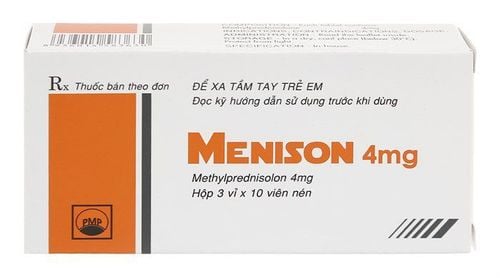This is an automatically translated article.
Zentofen medicine has the main active ingredient Flubiprofen 100mg and other excipients just enough. Zentofen belongs to the group of analgesics, antipyretics, and non-steroidal anti-inflammatory drugs, used in the treatment of rheumatism and osteoarthritis.
1. What is Zentofen?
Zentofen medicine has the main active ingredient Flurbiprofen 100mg and other excipients in a sufficient amount. Zentofen belongs to the group of pain relievers, antipyretics, non-steroidal anti-inflammatory drugs. The drug is used in the treatment of rheumatism and osteoarthritis.
Zentofen is available in the form of a film-coated tablet. Packaging is a box of 3 blisters, each blister contains 10 tablets.
Pharmacodynamics of the active ingredient:
The main drug Flurbiprofen sodium belongs to the group of phenyl alkanoic acids with antipyretic, analgesic and anti-inflammatory effects on inflammatory diseases in animals. Pharmacokinetics of the active substance:
Absorption: Flurbiprofen is well absorbed from the gastrointestinal tract. Distribution: Zentofen is highly bound to plasma proteins. Elimination: Zentofen is eliminated mainly in the urine. Effects of the drug:
Zentofen belongs to the group of non-steroidal anti-inflammatory drugs, also known as NSAIDs, with antipyretic, analgesic, and anti-inflammatory effects. This is a non-narcotic drug, used to relieve mild pain caused by trauma, menstrual pain, arthritis, musculoskeletal pain. Active ingredient Flurbiprofen sodium is used to inhibit pupillary constriction during eye surgery. In addition, the drug Flurbiprofen sodium is also used to prevent inflammation of the anterior part of the eye after surgery or laser irradiation for trabeculectomy.
2. What are the uses of Zentofen?
The main active ingredient Flurbiprofen belongs to the group of non-steroidal anti-inflammatory agents, has analgesic, antipyretic, anti-inflammatory effects. The mechanism of action of this active substance is inhibition of COX which reduces the biosynthesis of Prostaglandin. The drug works to treat specific diseases as follows:Treatment of signs and symptoms for people with rheumatic diseases such as stiffness, pain when climbing stairs, painful swelling of the extremities, aching hands, Symptoms are similar to those of the flu. Treatment of signs and symptoms for people with osteoarthritis such as sudden, persistent, sudden, unannounced pain.
3. Usage and dosage of Zentofen
How to use the drug:
Zentofen is made in the form of tablets, suitable for oral use. You should take the medicine after eating. When taking, do not chew the tablet, take the whole tablet with boiled or cooled water. The therapeutic dose for adults is as follows:
Initial treatment dose: 200-300mg per day, equivalent to 2 to 3 tablets, divided into 2 to 4 times a day. Maintenance dose: 100mg per day, equivalent to 1 tablet. Treatment dose for people with severe symptoms:
300mg per day, equivalent to 3 tablets. Treatment dose for people with dysmenorrhea:
Initial dose: 100mg, after 6 hours use 50-100mg. The maximum therapeutic dose is 300 mg/day. Treatment dose for children from 6 to 12 years old:
Use 3-4mg/kg daily, divided into several times a day. In case of overdose:
Manifestations of overdose are similar to symptoms of side effects. In addition, you may experience liver or kidney toxicity. The doctor will order to closely monitor the skin, face, blood pressure and take precautions because the dangerous condition can progress very quickly. Ideally, your condition should be reported to the treating doctor for timely treatment. In case of missed dose:
If you miss a dose, you need to skip the missed dose, do not overlap the dose with the next dose. Absolutely, should not skip the treatment dose more than 2 times in a row.
4. Undesirable effects of the drug Zentofen
The most common side effects when using Zentofen are burning sensation, temporary eye itching and other mild symptoms due to eye irritation. Although used topically in the eye, non-steroidal anti-inflammatory drugs can cause systemic effects, namely an increase in bleeding time, which is caused by interaction with platelet aggregation. Flurbiprofen sodium eye drops have been reported to increase the risk of bleeding in the eye tissue during eye surgery. Therefore, you need to be cautious when using Flurbiprofen sodium active ingredient during eye surgery in people who are prone to bleeding or are taking drugs that can prolong bleeding time.
Rare side effects when using Zentofen:
Dizziness, dizziness, headache, depression. Digestive disorders include abdominal pain, indigestion, nausea, vomiting, diarrhea, leading to complications of gastrointestinal bleeding. Anaphylactic, allergic, erythematous, edematous or pruritic reactions. Shortness of breath, feeling nervous. Decreased liver function, manifested as jaundice. Anemia. During the course of treatment, if you notice any unusual symptoms suspected of using Zentofen, you need to consult your treating doctor for timely and accurate treatment.
5. Interactions of Zentofen
During use, Zentofen may cause interactions with some of the following drug groups:
Antacids such as Maalox. Aspirin class non-steroidal anti-inflammatory drug. Diuretics such as Furosemide, Thiazide. β-adrenergic blocking drugs such as Propranolol. You need to proactively inform the treating doctor about the health-protective drugs or foods you are taking at this time to avoid unintended interactions.
6. Some notes when using Zentofen
Contraindications when using Zentofen:
Do not use Zentofen for people with a history of sensitivity or hypersensitivity to any of the ingredients in the drug. Contraindicated in cases of asthma, allergic reactions, anaphylaxis. No treatment with Zentofen for pain relief in people after CABG surgery. Do not use Zentofen for people with peptic ulcer disease, current or history of colitis, gastrointestinal bleeding. Precautions when using Zentofen:
Pregnant and lactating women / Caution when using Zentofen when driving or operating heavy machinery. This is because Zentofen can affect the nervous system. Use caution when using for people with cardiovascular disease such as heart failure, high blood pressure. Use this drug with caution in patients with liver or kidney failure. Monitor closely and carefully when using the drug with people with hemophilia. Be careful when using the drug with people with stomach diseases. During the use of the drug, you need to absolutely follow the doctor's instructions on the treatment dose, avoid increasing or decreasing the dose to shorten the treatment time. Before stopping using Zentofen, you need to consult your doctor. Note when using the drug:
If you notice that Zentofen appears strange signs such as discoloration, deformation, watery, you should not use anymore. Zentofen should be stored in a dry place with moderate humidity and away from direct sunlight. Keep away from children's play areas, so that your child can take Zentofen without your knowledge. The article has provided information about the uses, doses and precautions when using Zentofen. To ensure safety for your health and maximize the effectiveness of your treatment, you need to take Zentofen exactly as directed by your doctor.
Please dial HOTLINE for more information or register for an appointment HERE. Download MyVinmec app to make appointments faster and to manage your bookings easily.













